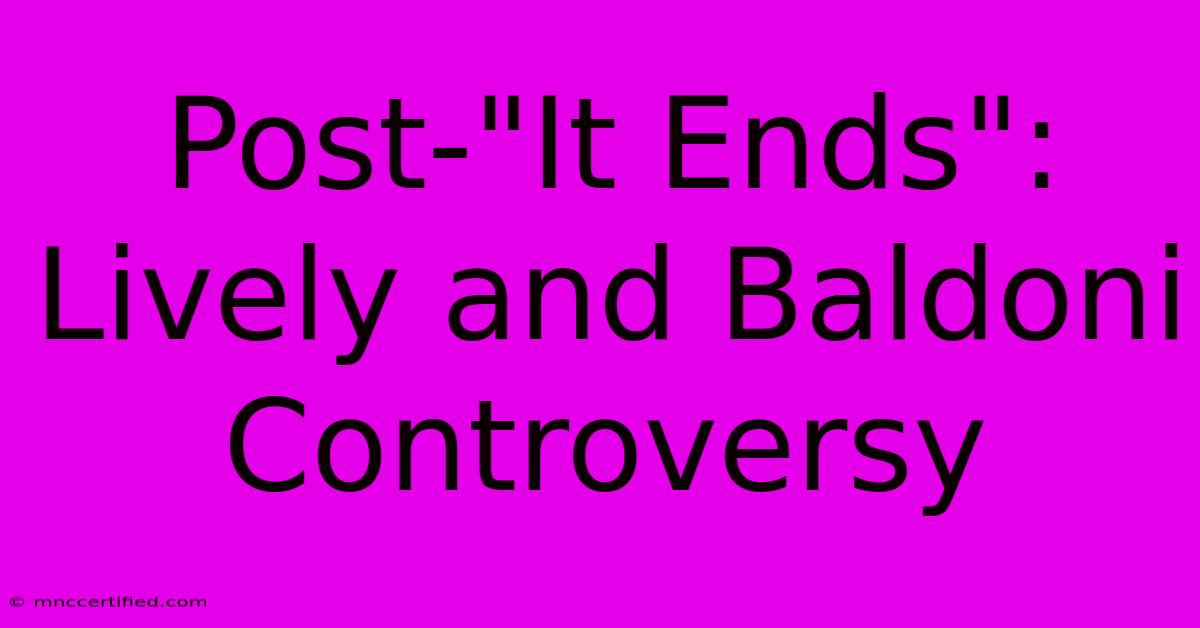Post-"It Ends": Lively And Baldoni Controversy

Table of Contents
Post-"It Ends With Us": The Colleen Hoover Lively and Baldoni Controversy Explained
The release of Colleen Hoover's It Ends With Us sparked a fervent, and often contentious, discussion around the portrayal of domestic abuse. While the novel garnered immense popularity, its depiction of this sensitive topic ignited a debate, particularly fueled by criticisms from author and actress America Ferrera and author Christina Lauren. This controversy, though initially focused on Hoover's work, expanded to encompass broader discussions about representation, trigger warnings, and the responsibility of authors when tackling difficult subjects.
Understanding the Core Issue: Trigger Warnings and Representation
The central point of contention revolved around the novel's depiction of domestic violence and the lack of, or perceived insufficiency of, trigger warnings. Critics argued that the graphic nature of the abuse, coupled with the romanticized aspects of the relationship, could be deeply triggering for survivors and potentially harmful. The debate also extended to questions of accurate representation. Some argued that Hoover's portrayal wasn't nuanced enough, potentially perpetuating harmful myths or minimizing the severity of domestic abuse. Others argued that the book's popularity among younger readers, many who might be experiencing similar situations, necessitated a more responsible and potentially less romanticized approach.
America Ferrera's Critique
America Ferrera, a vocal advocate for survivors of domestic violence, publicly criticized the book, emphasizing the need for responsible representation. She highlighted concerns about the book's potential to normalize or even glorify abusive relationships, inadvertently minimizing the seriousness of domestic abuse. Ferrera's comments ignited a wider conversation, bringing the debate to a broader audience beyond the book's immediate readership.
Christina Lauren's Perspective
Author Christina Lauren, known for her romantic comedies, also weighed in on the controversy. While acknowledging the book's popularity, she expressed concerns similar to Ferrera's regarding the potential for triggering content and the importance of responsible portrayals of sensitive topics. Lauren's involvement further broadened the discussion, highlighting that the controversy wasn't simply about It Ends With Us but about the wider implications of representing domestic violence in popular fiction.
The Defense of Colleen Hoover and Her Readers
Many readers and defenders of Hoover's work argued that the book, despite its controversial elements, ultimately served as a powerful tool for raising awareness about domestic abuse. They emphasized that the novel's exploration of a difficult topic, however flawed some might deem it, could lead to important conversations and even encourage victims to seek help. Furthermore, the sheer number of readers who connected with the story underscores its impact, suggesting that despite the criticisms, the novel resonated deeply with a large audience.
Counterarguments to the Criticism
Arguments in defense of the book often highlighted its intention: to shed light on a serious issue. Some argued that the very act of fictionalizing such a sensitive topic, even if imperfectly, could encourage dialogue and empathy. Moreover, the book's ending, showing the protagonist's escape and journey towards healing, was cited as a point of empowerment for readers.
The Broader Implications: Authorial Responsibility and Reader Impact
The controversy surrounding It Ends With Us highlighted the complex relationship between authors, their readers, and the responsibility that comes with depicting sensitive subject matter. It forced a broader discussion about trigger warnings, the ethical considerations of publishing potentially triggering content, and the impact of popular fiction on its readership. The debate raised vital questions that extend beyond a single book, impacting how authors approach writing about trauma and the crucial role of appropriate context and support for readers.
Conclusion: Navigating the Complexities of Representation
The It Ends With Us controversy remains a significant moment in the discussion surrounding responsible representation in literature. While opinions remain divided, the debate has undoubtedly spurred critical conversations about how sensitive topics are handled in popular fiction and the importance of considering the potential impact on readers. The ongoing dialogue continues to shape how authors and publishers approach the portrayal of trauma and violence, highlighting the vital need for responsible storytelling and a thoughtful approach to creating literature that both entertains and engages in vital social commentary.

Thank you for visiting our website wich cover about Post-"It Ends": Lively And Baldoni Controversy. We hope the information provided has been useful to you. Feel free to contact us if you have any questions or need further assistance. See you next time and dont miss to bookmark.
Featured Posts
-
Crystal Palace 1 5 Arsenal Match Report
Dec 22, 2024
-
Watch Aston Villa Vs Man City Live
Dec 22, 2024
-
Texans Dell Suffers Leg Injury
Dec 22, 2024
-
Social Security Act Cwas Official Statement
Dec 22, 2024
-
Nfl Highlight Pierce Vs Wilson Sack
Dec 22, 2024